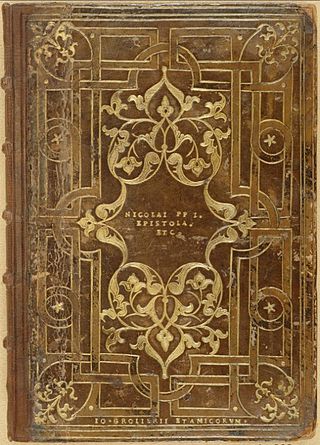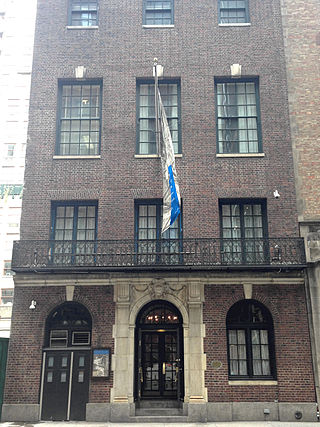Related Research Articles

Book collecting is the collecting of books, including seeking, locating, acquiring, organizing, cataloging, displaying, storing, and maintaining whatever books are of interest to a given collector. The love of books is bibliophilia, and someone who loves to read, admire, and a person who collects books is often called a bibliophile but can also be known as an bibliolater, meaning being overly devoted to books, or a bookman which is another term for a person who has a love of books.

Bibliophilia or bibliophilism is the love of books. A bibliophile or bookworm is an individual who loves and frequently reads and/or collects books.

Hrotsvitha was a secular canoness who wrote drama and Christian poetry under the Ottonian dynasty. She was born in Bad Gandersheim to Saxon nobles and entered Gandersheim Abbey as a canoness. She is considered the first female writer from the Germanosphere, the first female historian, the first person since the Fall of the Roman Empire to write dramas in the Latin West, and the first German female poet.

Jean Grolier de Servières, viscount d'Aguisy was Treasurer-General of France and a famous bibliophile. As a book collector, Grolier is known in particular for his patronage of the Aldine Press, and his love of richly decorated bookbindings.

Belle da Costa Greene was an American librarian who managed and developed the personal library of J. P. Morgan. After Morgan's death in 1913, Greene continued as librarian for his son, Jack Morgan, and in 1924 was named the first director of the Pierpont Morgan Library. Despite being born to Black parents, Greene spent her professional career passing for white.

The Grolier Club is a private club and society of bibliophiles in New York City. Founded in January 1884, it is the oldest existing bibliophilic club in North America. The club is named after Jean Grolier de Servières, Viscount d'Aguisy, Treasurer General of France, whose library was famous; his motto, "Io. Grolierii et amicorum" [of or belonging to Jean Grolier and his friends], suggested his generosity in sharing books.
Eleanor Cross Marquand was an authority on the representation and symbolism of flowers and trees in art, particularly of floral emblems in the early Christian church. In recognition of this work, she received an honorary Master of Arts Degree from Princeton University in 1948, only the 4th woman in the history of the university to receive this honor.
Sarah Gildersleeve Fife was a prominent force among women bibliophiles in the first half of the 20th century and a leader in gardening and horticulture, advocating the use of plantings around army bases and military hospitals.
George Hill Mathewson Lawrence was an American botanist, writer and professor of botany who helped establish the 'Liberty Hyde Bailey Hortorium', the Hunt Botanical Library and the Huntia journal. He was also an avid book collector, including books on the history of Rhode Island, historic books and botanical art.
Henrietta Collins Bartlett (1873–1963) was an American bibliographer, Shakespeare scholar, and creator of the first modern census of Shakespeare's published drama. She has been called "one of the foremost bibliographers of her time," despite working in a scholarly field in which "the overwhelming majority has been male."
The Fellowship of American Bibliophilic Societies (FABS) is an association of American book clubs whose members seek interaction with book collectors across the country and around the world. At The Rowfant (Book) Club's 100th anniversary celebration in 1992, local members and their guests from book clubs in New York, Chicago, Philadelphia, and San Francisco discovered common interests in bibliophilic book clubs. The new association's first meeting was November 5, 1993, in New York, at The Grolier Club. In 1994, the group drew up articles of association outlining their goals to promote and develop common interests of the member societies.
Frances Milliken Hooper was a journalist, one of the first female advertising executives in the United States, founder and president of the Frances Hooper Advertising Agency.
Margaret Bingham Stillwell was an American librarian and bibliographer who spent most of her professional career as curator of the Annmary Brown Memorial.
Rachel McMasters Miller Hunt (1882-1963) was an American bookbinder and book collector, specializing in botanical literature.
Sara B. Hill (1882-1963) was an American bookplate designer, and a charter member of the American Society of Bookplate Designers and Collectors.
Anne Lyon Haight was an American author, essayist, and collector of rare books and artifacts.
Ruth S. Granniss (1872–1954) was an American librarian, known for her longtime position as Librarian of the Grolier Club, which she held from 1906 to 1944.
Lola L. Szladits (1923-1990) was an American librarian. She was the curator of New York Public Library's Berg Collection of English and American Literature for twenty years.
Deborah Evetts is a fine bookbinder and book conservator.
Julia Parker Wightman was an American bibliophile and book collector.
References
- ↑ Ozment Kate. 2023. The Hroswitha Club and the Impact of Women Book Collectors. Cambridge United Kingdom: Cambridge University Press.
- ↑ "Rachel McMasters Miller Hunt". Hunt Institute for Botanical Documentation. Hunt Institute for Botanical Documentation. Retrieved 11 June 2020.
- 1 2 3 4 5 6 "Hroswitha Club: Records and Publications, 1944-1999". The Grolier Club. Finding Aids. Retrieved March 18, 2019.
- 1 2 3 Ardizzone, Heidi (2007). An Illuminated Life: Belle Da Costa Greene's Journey from Prejudice to Privilege. W.W. Norton & Company. ISBN 9780393051049.
- ↑ Silverman, Willa Z. (2008). The New Bibliopolis: French Book Collectors and the Culture of Print, 1880-1914. University of Toronto Press. p. 261. ISBN 9780802092113.
- 1 2 3 Curtis, S.; Updike, John; Lemon, Richard (August 10, 1957). "Hroswithians". New Yorker: 18–19.
- ↑ Grasberger, George J. C. (May 8, 1949). "What is so Rare". The Philadelphia Inquirer . p. 210. Retrieved March 19, 2019– via newspapers.com.
- ↑ "Mrs. Anne Haight Dies; Was Author, Traveler". Hartford Courant . Litchfield, Connecticut. August 10, 1977. p. 3. Retrieved March 19, 2019– via newspapers.com.
- ↑ "Guide to the Frances Hooper Papers 1928-1976". University of Chicago Library. Retrieved 19 March 2019.
- ↑ A Companion to Hrotsvit of Gandersheim (fl. 960): Contextual and Interpretive Approaches. BRILL. 12 October 2012. pp. 355–. ISBN 978-90-04-23439-0 . Retrieved 19 March 2019.
- ↑ Bayerschmidt, Carl (1966). "Review: Hroswitha of Gandersheim. Her Life, Times and Works, and a Comprehensive Bibliography. Edited by Anne Lyon Haight". The Germanic Review. 41: 302–303. doi:10.1080/19306962.1966.11754646.
- ↑ Johnson, Mary Catherine (Summer 2004). "Rachel McMasters Miller Hunt as collector and patron of the arts" (PDF). Journal of William Morris Studies: 143–153. Retrieved 12 June 2020.
- ↑ Hastings, Emi (16 September 2014). "Women Collectors in Their Own Words". Adventures in Book Collecting. Retrieved 18 March 2019.
- ↑ "Miriam Y. Holden, 83, Activist and Collector". The New York Times. 8 January 1977. Retrieved March 18, 2019.